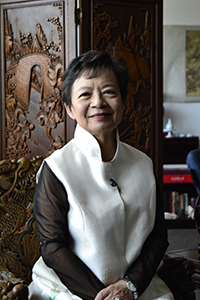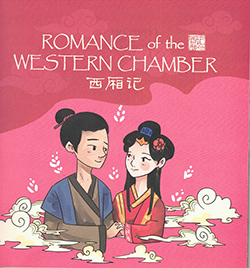

SAN DIEGO — Li-rong (Lilly) Cheng, Ph.D., director of the Chinese Cultural Center at San Diego State University, loves well-told stories about China, whether they be fiction or non fiction. Over the years, she has been involved in promulgating stories of each type, and in two particular cases, the story telling has involved Jews.
Prof. Cheng collaborated with the late Howard Rubenstein, M.D., on a translation and abridgement of an ancient Chinese tale, Xi Xiang Ji, which dates back to the Tang Dynasty of the 7th to 10th Century CE. Rubenstein compressed the tale, which typically the Chinese had enacted over three days of performances,, into a 2 /12 hour-long English-language play titled Romance of the Western Chamber, which won acclaim in Hangzhou (where it was shown with Mandarin supertitles) in 2011.
Six years later, with music by Erich Rausch, Romance of the Western Chamber, premiered off-Broadway to favorable reviews. In 2020, the musical was scheduled to have its West Coast premiere in San Diego, under the auspices of the Chinese Cultural Center, but it had to be postponed because of the coronavirus pandemic. Before it could be rescheduled, Rubenstein, 89, died in September 2020. Prior to that, his wife, Judith Rubenstein, Ed.D, owner of Granite Hills Press, published a bilingual abridgement of the story, with Prof. Cheng providing the Mandarin translation.
 In a nutshell, the story features the young, bright, but poor scholar, Chang, who travels to the capital of the province of Chang-an (now called Xian) in the hope of taking examinations and advancing himself. He is permitted to study at a monastery where the beautiful Ying-ying, daughter of the late prime minister, also has been living with her mother. The two young people are immediately attracted to one another, but unfortunately, Ying-ying has been promised in marriage to a rich lord, Cheng-heng, whom she doesn’t even like. The beautiful Ying-ying is also desired by the cruel bandit leader, Flying Tiger, who lays siege to the monastery, announcing that unless he is permitted to marry her, he will destroy the monastery and the people within it. Ying-ying’s mother, Madam Tsui, says if anyone can devise a plan to save the monastery, she will allow that person to marry Ying-ying. Young Chang sends an appeal to his friend, General White Horse, who defeats Flying Tiger in battle. But once the danger has passed, Madame Tsui, regretfully announces that she is unable to withdraw her daughter’s engagement to Cheng-heng. At this point the lovers must find another way to be together.
In a nutshell, the story features the young, bright, but poor scholar, Chang, who travels to the capital of the province of Chang-an (now called Xian) in the hope of taking examinations and advancing himself. He is permitted to study at a monastery where the beautiful Ying-ying, daughter of the late prime minister, also has been living with her mother. The two young people are immediately attracted to one another, but unfortunately, Ying-ying has been promised in marriage to a rich lord, Cheng-heng, whom she doesn’t even like. The beautiful Ying-ying is also desired by the cruel bandit leader, Flying Tiger, who lays siege to the monastery, announcing that unless he is permitted to marry her, he will destroy the monastery and the people within it. Ying-ying’s mother, Madam Tsui, says if anyone can devise a plan to save the monastery, she will allow that person to marry Ying-ying. Young Chang sends an appeal to his friend, General White Horse, who defeats Flying Tiger in battle. But once the danger has passed, Madame Tsui, regretfully announces that she is unable to withdraw her daughter’s engagement to Cheng-heng. At this point the lovers must find another way to be together.
I’ll leave the story at that point, so as not to spoil how the couple went about pursuing a “happily ever after” ending. But I will pass on Prof. Cheng’s comments on the back cover of the children’s story: “Long before women’s liberation, the heroine, Ying-ying, a beauty, was portrayed as highly intelligent and talented. She excelled not only in calligraphy and writing poetry, but also in calculating on the abacus, a national treasure of China. The hero, Chang, achieves success through intelligence, hard work, and study, not only through good looks and charm. Two admirable characters find love and happiness.”
The professor’s current project, in a collaboration between SDSU’s Chinese Cultural Center and SDSU’s Jewish Studies Program, is a Zoom showing of the documentary Above The Drowning Sea, which is scheduled to be seen at 10 a.m., Sunday, Feb. 21, followed by commentary by the film’s producer, Carolyn Hsu-Balcer, and her writer/co-director and husband Rene Balcer, the executive director and show runner of the popular Law and Order television series.
The documentary tells the story of the Jews who were able to escape Nazi persecution in Austria thanks to the intercession of the Chinese Consul-General in Vienna, Ho Feng Shan. Many of the refugees who were children at the time are alive today, including Guenter Cohn of San Diego, who has spoken locally from time to time about his experiences in Shanghai.. Although the documentarians did not meet Cohn during the filming, they did conduct interviews with other former refugees in the U.S., Canada (where Balcer is from), Israel, Austria, Italy, and, of course, China. A trailer for the film may be viewed above. The actual narrator of the film is not the woman whose voice you will hear in the trailer, but one who is far more familiar to American viewers: actress Julianna Margulies, who starred as Carol Hathaway in the television series ER and as Alicia Florrick in The Good Wife, a later series.
In organizing the Feb. 21 showing of the documentary, Professor Cheng desired it to be as close as possible to the Feb. 12 Chinese Lunar New Year. Participating in planning and outreach to the Jewish community are Marie Raftery, a past president of Jewish Family Service, and her husband Robert Rubenstein; Lawrence Baron, former director of the Lipinsky Institute of Jewish Studies at SDSU; the adult education program of Temple Emanu-El, Jewish Family Service of San Diego, and this reporter. Registration via this website.
*
Donald H. Harrison is editor of San Diego Jewish World. He may be contacted via donald.harrison@sdjewishworld.com